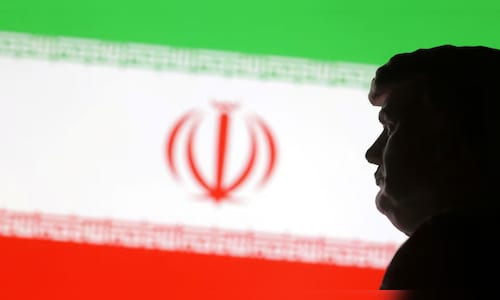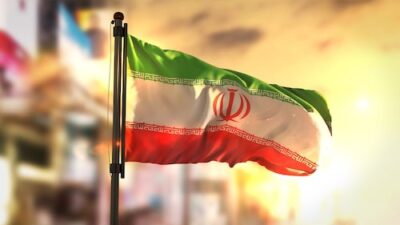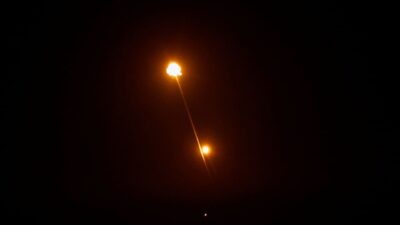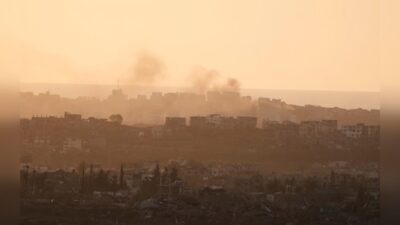In an extensive aerial assault, Israel dispatched 200 fighter jets and targeted over 100 locations throughout Iran, including several in Tehran. In light of this escalation, the Israeli government has proclaimed a nationwide state of emergency. Prime Minister Benjamin Netanyahu justified the military operation, asserting that it would persist for as long as necessary.
Iran’s Supreme Leader Ayatollah Ali Khamenei has vowed retaliation, cautioning that Israel would encounter severe repercussions. Iranian state media reported the deaths of civilians in Tehran and aired footage of protests, with crowds chanting “Death to Israel” and “Death to America.”
Both nations have closed their airspace until further notice. Iran has launched hundreds of drones toward Israel, and the Israeli military claims it is actively intercepting them.
Meanwhile, US President Donald Trump has urged Iran to engage in negotiations. “There has already been great death and destruction,” he posted on Truth Social, “but there’s still time to halt this slaughter and the upcoming, more brutal attacks. Iran must reach a deal before there is nothing left, preserving what was once known as the Iranian empire.”
US Secretary of State Marco Rubio clarified that Israel’s actions were independent, indicating that the US was not involved in the strikes.
To discuss the potential future of Iran-Israel relations, CNBC-TV18 interviewed KC Singh, former foreign secretary, and Benny Benjamin, former Israeli Defence Force Officer.
Below is the verbatim transcript of the discussion.
Q: Donald Trump stated on Truth Social: “Just make a deal before it’s too late, before there is nothing left.” This rhetoric is unprecedented for an American president. What do you think will transpire? Iran is unlikely to remain passive. Ayatollah Khamenei has promised retaliation. In your opinion, how soon and how forcefully will this occur?
KC Singh: President Trump initiated discussions in March by sending a letter to Iranian leaders. The dialogues began in Muscat, but by June, a division became apparent when President Khamenei tweeted about intentions to shut things down completely.
The Americans proposed a deal requiring Iran to entirely dismantle its nuclear program. This was a marked departure from the 2015 JCPOA agreement involving the five permanent UN Security Council members and Iran, which Trump annulled during his presidency. The previous deal permitted Iran to continue nuclear enrichment under IAEA oversight, subject to time and scope constraints.
After Trump’s withdrawal, Iran resumed expanding its program. Currently, they reportedly possess approximately 500 kilograms of uranium enriched to 60%. For context: weapons-grade uranium is enriched to 90%. While progressing from 2–3% to 60% takes time, the leap from 60% to 90% can be executed rapidly, suggesting Iran could potentially produce enough material for one weapon monthly or have existing stock for multiple devices.
We are still assessing the damage inflicted by the Israeli strikes. While Natanz is exposed, several other facilities exist deep underground or within mountains, leaving their status uncertain.
As for Iran’s options: the Americans have claimed they were uninvolved. However, Iran had previously warned that any Israeli attack would be regarded as an American act, leading to retaliation against US interests in the Gulf. This is why the US evacuated diplomats from Iraq and relocated families from military bases in the region.
Thus far, Iran hasn’t attacked the US, and they may choose not to escalate further. They will retaliate against Israel—but Israel’s Iron Dome and sophisticated air defense systems restrict the effectiveness of such attacks.
This situation limits Iran’s options. Hezbollah is currently too weak. Hamas has been severely weakened. Syria provides no real assistance under its existing leadership. Although Iran may receive advisory support from Russia or China, neither is likely to engage militarily.
Trump’s recent comments may escalate tensions further. His approach seems coordinated with Israel, despite him adopting a “good cop” persona. This undermines perceived neutrality and could intensify Iranian resentment.
Iran is a proud civilization with a 2,500-year history, dating back to the Achaemenid Empire. Trump’s reference to that heritage might be perceived as an insult when telling them to accept permanent limitations on their sovereignty.
Therefore, I doubt they will concede. In fact, street protests are already expressing defiance. If Netanyahu anticipates this will lead to regime change, he is mistaken. It may actually reinforce the regime’s grip.
Let us hope this does not escalate further in the Gulf.
Q: Benny Benjamin, would you agree that this represents the culmination of Israel’s military efforts against Hamas and Iranian proxies? Has everything been leading to this point?
Benny Benjamin: Firstly, we must recall that this began on October 7. Hamas, as Iran’s proxy, initiated an attack on Israel, prompting responses from Hezbollah, followed by attacks from Iraq, Yemen, and Syria.
Initially, we pleaded for peace. We reached out to the Lebanese, Syrians, and Houthis. However, Iran financed these groups with substantial sums; that is the real foundation of this conflict.
Yes, Netanyahu has sounded the alarm on Iran since 2005. However, I will refrain from detailing Iran’s nuclear program—as I lack all the specifics. Still, everything can be traced back to October 7.
We have responded to Hamas. We have targeted Hezbollah and struck locations in Syria. There’s a new president in Syria. The Houthis continue their attacks. There seems to be no end in sight.
No nation—whether Israel or India (my birthplace)—can afford to endure daily attacks. We have endured bomb shelter life for over two years. Such a situation is unsustainable.
Thus, this conflict was inevitable. Americans attempted negotiations, but President Trump made it clear they were ineffective. He stated Iran would not change. Hence, in my view, Netanyahu’s actions tonight—again, I lack complete operational details—but as an Israeli citizen, I believe something had to give.
Q: Ambassador KC Singh, what options does Iran have to compel the world—particularly the US—back to the negotiating table? Could they block the Strait of Hormuz?
Singh: They certainly possess that capability, but I don’t believe they will resort to that—not yet. It would also harm their economy. They were already involved in discussions with the Americans, but the US demanded a complete dismantling of Iran’s nuclear program. This is unacceptable to the Supreme Leader.
The Iranians seemed more willing to return to the JCPOA, the previous 2015 agreement. However, that is not acceptable to Trump—who discarded it, insisting Iran must not have any nuclear program.
The issue with Trump is that he attempts to play both sides—being involved while also acting as a bystander. Traditionally, the US has served both as a participant and mediator in such crises. That balancing act is no longer present.
Even under President Biden, the US was not viewed as neutral. Consider Gaza—daily civilian casualties, with minimal US restraint on Israel. Netanyahu faces significant internal political pressure—he barely maintains his government. His support in Europe has waned. Yet Trump remains firmly in his corner, backed by a powerful pro-Israel lobby in the US.
In this context, the US lacks the credibility to mediate. Iran is unlikely to return to negotiations unless the conditions are altered—and that is uncertain. Trump expresses frustration that Netanyahu isn’t paying him heed, but he isn’t exerting genuine pressure.
The US must reassess its position. A more neutral stance is essential to temper Israel’s far-right government. And remember, Israeli politics are unstable. Ultimately, it is for the Israeli populace to decide: do they desire this hardline government, or a more conciliatory leadership that seeks peace both domestically and internationally?
Q: Benny Benjamin, do you sense that Israel is now committed for the long run? The Israeli Ambassador mentioned they anticipate retaliation from Iran. Will this conflict drag on for months?
Benjamin: I hope and pray it won’t extend for months. We are a small nation, and this impacts everyone—our citizens, our lives.
One thing I can assert definitively—Israel does not desire war. Absolutely not. However, achieving peace in this region is challenging. We maintain peace with Jordan and Egypt, and have even normalized relations with the UAE. Yet, we cannot achieve that with Hamas or groups like the Muslim Brotherhood.
We cannot permit another nation—such as Iran, which possesses nuclear weapons— to exist. This is not acceptable.
I am aware of developments in India, Israel, and elsewhere concerning groups like the Brotherhood. I am not generalizing about Muslims; rather, I’m speaking about that specific ideology. Change is necessary.
And if Iran—or any adversary—extends a hand for peace, we will warmly accept it. We have enjoyed peace with Jordan and Egypt for decades, and no Israeli soldier has been killed there since. That is the most desirable situation. The Israeli public understands this. We support peace.



